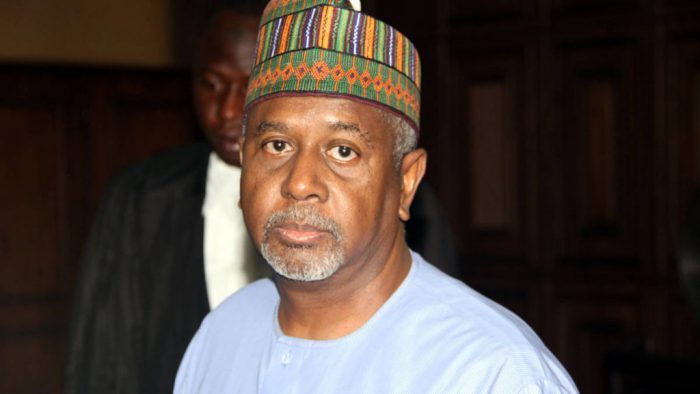The Federal High Court in Abuja on Thursday affirmed the bail granted the former National Security Adviser, Sambo Dasuki, in the charge of unlawful possession of firearms and money laundering brought against him by the Federal Government.
Justice Ahmed Mohammed affirmed the bail shortly after taking Mr. Dasuki’s plea in the amended seven-count charge.
The judge said that since the prosecution counsel, Oladipo Opeseyi, did not object to the bail of the ex-NSA, the court has to affirm same. He ordered the defendant to continue to enjoy the bail condition granted him in 2015 when he was first arraigned.
Despite being granted bail by various courts, Mr. Dasuki, a retired colonel, remains in the custody of the State Security Service.
Mr. Dasuki had in 2015 been admitted to bail by Justice Adeniyi Ademola, but the bail order was not obeyed by the federal government. Other bails granted by Justice Peter Affen and Justice Husseini Baba-Yusuf of the FCT High Court were also ignored.
The ECOWAS Court also ordered the immediate release of Mr. Dasuki, who is accused of mismanaging billions of dollars meant for purchase of arms, describing his detention as illegal and unlawful.
All the court orders have, however, been ignored.
In the amended charge for which the court say on Thursday, Mr. Dasuki was accused of being in possession of prohibited firearms without the requisite licences in July 2015 contrary to Section 28 of the Firearm Act Laws of the Federation of Nigeria 2004.
He was specifically alleged to have been in possession of Trevor Rifles at his residence in Abuja.
Besides the firearms, Mr. Dasuki was also accused of money-laundering and was specifically said to have been in possession of $40,000, N5million and £20,000 allegedly in his house in July 2015 and said to be proceeds of unlawful act contrary to Section 15 (3) of the money laundering prohibition act 2011.
The amended charge also indicated that $150,000 and N37 million being part of proceeds of unlawful act was also found in the Sokoto residence of former NSA on July 16, 2015.
When the charges were read, Mr. Dasuki denied all of them.
The prosecution counsel thereafter informed the court of his readiness for trial and that he had a motion pending before the court for secret trial. He sought protection for witnesses billed to testify against the NSA.
Mr. Opeseyi informed the court that since the amended charge bear the same counts with the previous charge, the court should exercise its order on the bail earlier granted the defendant by allowing him to continue to enjoy the bail.
The counsel to Mr. Dasuki, Ahmed Raji, agreed that the previous bail granted his client be allowed to continue since there was no objection from the prosecution. Mr. Raji, however, said that he opposed the motion filed since June 3, 2016 seeking protection for prosecution witnesses on the ground that the motion was predicated on the old charge.
Mr. Raji informed the court that the prosecution had in January 23, 2017 filed an application on the same issue and wondered why the prosecution chose to move backward to the motion of 2016 instead of going ahead with that of 2017.
He urged the court to allow him time to look for the counter-affidavit filed by his client against the 2016 motion so as to enable him respond appropriately as required by law.
Mr. Raji told the court that the issue of trial should not be decided by the court until the issue of secret trial being sought by the prosecution in the matter is resolved.
Justice Mohammed, while affirming the bail granted Mr. Dasuki in 2015, adjourned the matter till May 11, 2017 for the motion for secret trial to be determined.
It would be recalled that Justice Adeniyi Ademola had in 2015 dismissed the application for the secret trial of the former NSA on the ground that the prosecution had already filed the names and addresses of all the witnesses and made same available to the general public.
Justice Ademola had then ruled that since the identities of the witnesses had already been made available to the public, there was no need for the prosecution to seek to engage in the secret trial of the defendant.
Premium Times
This page has been viewed 304 times


























